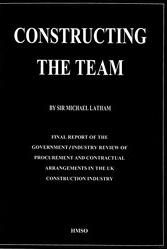Latham Report
Contents |
[edit] Background Information
The construction industry in the UK has consistently performed in a way that is thought to be wasteful compared to other industries. There is a general impression that it does not deliver good value for its customers. In part this is due to the unusual nature of the industry, where, unlike a production line, each building is a one off. But in addition, the nature of contracting arrangements means that it can be an adversarial industry with significant potential for disputes.
A succession of reports had considered how to tackle these issues, including; ‘Building to the Skies’ in 1934, the Simon Report in 1944 and the Barnwell report in 1967. However, their recommendations largely failed to gain traction within the industry.
In 1994 the Latham Report 'Constructing the Team' was published. The report was commissioned by the UK government to investigate the perceived problems with the construction industry, which the report’s author, Sir Michael Latham described as ‘ineffective’, ‘adversarial’, ‘fragmented’ and ‘incapable of delivering for its customers’.
[edit] Recommendations
Latham proposed that the client should be at the core of the construction process and that the industry should move away from its adversarial structure, adopting a more integrated approach with greater partnering and teamwork.
There were a great number of detailed recommendations within the report, some of which are set out below:
- As the largest single procurer of construction, the government should commit itself to becoming a best practice client.
- The New Engineering Contract (NEC) should be adopted more widely as a less adversarial form of contract.
- There should be legislation to prevent ‘set off’.
- Partnering should be used to encourage the establishment of long-term contracting arrangements.
- Public sector registers should be established for approved contractors, sub-contractors and consultants.
- There should be greater standardisation and better integration of contract documents.
- There should be compulsory latent defects insurance.
- There should be publication of a number of codes of practice and guidance documents to clarify, co-ordinate and standardise practices across the industry.
- A specified duty to deal fairly with each other, and the supply chain in an atmosphere of mutual co-operation.
- Interrelated documentation, clearly defining roles.
- Risk allocation to the party best able to manage, estimate and carry it.
- The avoidance of conflict, speedy dispute resolution and adjudication.
- Firm duties of teamwork with shared financial motivation.
The Latham report refers to 'partnering' and includes the concept of teamwork between supplier and client, in a process of total continuous improvement. It required openness between the parties, ready acceptance of new ideas, trust and perceived mutual benefit.
Latham suggested that if the full range of measures described in the report were adopted, savings of 30% could be achieved over five years.
[edit] Risk
Increasing numbers of construction projects are using risk management to cut costs and reduce errors. The Latham Report recommended that the most effective form of contract should include a 'choice of allocation of risks, to be decided as appropriate to each project but then allocated to the party best able to manage, estimate and carry the risk'. There are four common methods of dealing with risk: avoidance, abatement, retention and transfer.
[edit] Consequences
The Latham report led to the creation of the Construction Industry Board (CIB) in 1995 to oversee implementation of its recommendations (the CIB was replaced by the Strategic Forum for Construction in 2001, chaired by Sir John Egan, author of the Egan Report 'Rethinking Construction').
A number of other organisations were established following the Latham report and the subsequent Egan Report:
- Reading Construction Forum
- Design Build Foundation
- Construction Best Practice Programme
- Movement for Innovation
- Local Government Task Force
- Rethinking Construction
- Be
- Constructing Excellence
- Construction Clients' Group
These organisation united to become Constructing Excellence in 2003.
Some of the recommendations of the Latham Report were implemented by the Housing Grants Construction and Regeneration Act (the Construction Act) which amongst other things, set out fair payment practices and regulated ‘set off’. In addition, the Scheme for Construction Contracts, which applies when construction contracts do not comply with the Housing Grants, Construction and Regeneration Act established the right to adjudication.
The Report also led to the creation of the Considerate Constructors Scheme intended to help improve the image of the construction industry.
More recently, there have been significant moves in government procurement to encourage collaborative working and foster partnering, and the government has abandoned GC Works contracts in favour of NEC3.
[edit] Subsequent reports
The Latham report has been followed by a number of subsequent reports, with similar aims:
- In 1995, the Levene 'Efficiency Scrutiny' report was published.
- In 1996, the CIB published a second report, 'Partnering in the Team'.
- The core message of Constructing the Team was reinforced by the Egan Report in 1998 'Rethinking Construction'.
- In 2001, the National Audit Office (NAO) published 'Modernising Construction'
- In 2002 the Strategic Forum for Construction published a report on its first year of activity Accelerating Change.
- In 2011 the Government Construction Strategy made a damning assessment of the industry, suggesting amongst many criticisms that:
- the UK does not get full value from public sector construction
- there is broad consensus, spread both across the industry and its customers, that construction under-performs
- (there are) poor and inconsistent procurement practices… leading to waste and inefficiency
- (there are) low levels of standardisation, and fragmentation of the public sector client base
Several of these reports have made similar projections of substantial savings within the industry if their recommendations were adopted. Notably, the Government Construction Strategy states an intention to achieve savings of 15 to 20%.
Given that despite all of these reports, the perception of the industry as wasteful and adversarial remains, and that significant savings continue to be projected if the industry reforms, it might be inferred either that; under the circumstances the industry operates more effectively than it appears from the outside; or that expectations are unrealistic; or that recommendations have been consistently poorly implemented. See List of construction industry reports since 1944 for more information.
It is worth noting that criticism of construction is not peculiar to the UK, and that for example similar assessments have been made in the USA (ref Constructing the team: A US Perspective, King 1996).
[edit] Sir Michael Latham
Sir Michael died on 2 November 2017, aged 74.
Born in Southport, he was MP for Melton between 1974 and 1983, when the constituency changed to Rutland and Melton. He stood down in 1992. He was married to Caroline, and had two sons, Richard and James.
He was chairman of the Construction Industry Training Board (CITB) for eight years. 2017 CITB chairman James Wates said; "His commitment to and passion for the industry was clear to all of us who worked with him."
He was also ConstructionSkills chairman until 2010 and chairman and deputy chairman of Willmott Dixon until 2009.
Julia Evans, Chief Executive at BSRIA, said; "...Sir Michael’s contribution to the industry is remarkable. And he has undoubtedly left the industry in an enhanced place.”
[edit] Related articles on Designing Buildings
- Adjudication.
- Adversarial behaviour in the UK construction industry.
- Accelerating change: A report by the Strategic Forum for Construction.
- Banwell Report.
- Centrally procured public projects.
- Collaborative practices.
- Considerate Constructors Scheme.
- Constructing Excellence.
- Construction 2025.
- Construction Industry Board.
- Construction Task Force.
- Egan Report.
- Emmerson Report.
- Fair payment practices.
- Fragmentation of the UK construction industry.
- Government Construction Strategy.
- Housing Grants Construction and Regeneration Act.
- Levene report
- List of construction industry reports since 1944.
- New Engineering Contract.
- Office of Government Commerce.
- Partnering.
- Public procurement.
- Reinventing construction: a route to higher productivity.
- Scheme for Construction Contracts.
- Sir John Egan.
- Sir Michael Latham.
- Supply chain management.
- Thought leadership.
Featured articles and news
A case study and a warning to would-be developers
Creating four dwellings... after half a century of doing this job, why, oh why, is it so difficult?
Reform of the fire engineering profession
Fire Engineers Advisory Panel: Authoritative Statement, reactions and next steps.
Restoration and renewal of the Palace of Westminster
A complex project of cultural significance from full decant to EMI, opportunities and a potential a way forward.
Apprenticeships and the responsibility we share
Perspectives from the CIOB President as National Apprentice Week comes to a close.
The first line of defence against rain, wind and snow.
Building Safety recap January, 2026
What we missed at the end of last year, and at the start of this...
National Apprenticeship Week 2026, 9-15 Feb
Shining a light on the positive impacts for businesses, their apprentices and the wider economy alike.
Applications and benefits of acoustic flooring
From commercial to retail.
From solid to sprung and ribbed to raised.
Strengthening industry collaboration in Hong Kong
Hong Kong Institute of Construction and The Chartered Institute of Building sign Memorandum of Understanding.
A detailed description from the experts at Cornish Lime.
IHBC planning for growth with corporate plan development
Grow with the Institute by volunteering and CP25 consultation.
Connecting ambition and action for designers and specifiers.
Electrical skills gap deepens as apprenticeship starts fall despite surging demand says ECA.
Built environment bodies deepen joint action on EDI
B.E.Inclusive initiative agree next phase of joint equity, diversity and inclusion (EDI) action plan.
Recognising culture as key to sustainable economic growth
Creative UK Provocation paper: Culture as Growth Infrastructure.
























Comments
To start a discussion about this article, click 'Add a comment' above and add your thoughts to this discussion page.